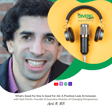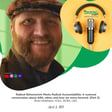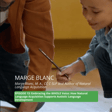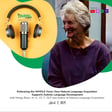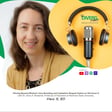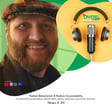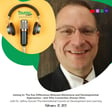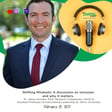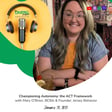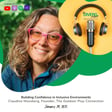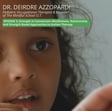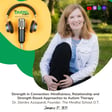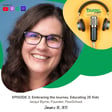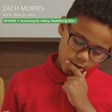Vision of Inclusive Community Membership
00:00:00
Speaker
great you know I think being in partnership, um figuring out ways to um share what your vision is for your child and if your vision for your child is that they're a full member of the community and the community part of it is school, right? yeah then Then that's your vision.
00:00:21
Speaker
And how do we make that vision come to life, right? right So that can be a ah checkpoint, I think, sometimes for families to say, yeah, but I really want my child to be a full member of this you know community and have a sense belonging with their peers.
00:00:38
Speaker
And then how do we, you know, how do we work to make that happen?
Bridging Specialized Knowledge and Parenting
00:00:42
Speaker
Welcome to the Diverge podcast, inclusive of autistic and other neurodivergent voices. We exist to bridge the gap between specialized knowledge and everyday parenting.
00:00:52
Speaker
We are on a mission to bring together the most forward thinking experts who are deep in the trenches, championing neuroaffirming and developmentally based approaches to therapy, to education and life.
00:01:04
Speaker
Designed for parents, educators, friends, and allies. Conversation by conversation, insight by insight, we are building community and making space for all kinds of minds.
00:01:17
Speaker
Hi, everyone. Welcome to the podcast.
Introduction to Dr. Catalano
00:01:19
Speaker
Today, we are talking to Dr. Catalano. She is the Associate Director for Education, Inclusion, and Development at the Center for Autism and Early Childhood Mental Health in the College for Education and Engaged Learning at Montclair State University.
00:01:33
Speaker
Dr. Catalano, simply put, is an expert in early childhood education and inclusion. I met Dr. Catalano when we were just out of preschool and headed into kindergarten, and she quickly became ah very helpful resource for me in terms of inclusion and the appropriate environments for my son, but also just a source of information that I wish I had had a couple of years earlier when I was first navigating diagnosis and preschool
World Down Syndrome Day Dedication
00:02:01
Speaker
So I really hope that this episode serves as the information I did not have for a lot of parents, but it is meaty, it is filled with really great knowledge about how inclusion works, even in early childhood environments, and it is applicable to inclusion across the board.
00:02:17
Speaker
So please listen, absorb, take in If you have questions, feel free to reach out. I will do my best to get them answered. Also want to give a little shout out slash dedication. Today is World Down Syndrome Day. and in honor of World Down Syndrome Day, one of my very good friends, Elena and her daughter Hope, have become my expanders, if you will, for understanding what inclusion looks like and what it means for a child to be truly included. and i am so grateful for that model.
00:02:46
Speaker
so I just want to give them a huge shout out and say we love you and we're dedicating this episode to you. Let's jump into it.
Preschool Inclusion Projects
00:02:57
Speaker
Dr. Catalano, welcome to the podcast. Why don't you get us started by introducing yourself and telling us a little bit about what it is you do.
00:03:08
Speaker
Sure. Christy. Thanks for having me. Hey, everybody. So, yes, I am Corinne Catalano. I'm at Montclair State University Center for Autism and Early Childhood Mental Health, where I'm currently the Associate Director for Education and Inclusion and Development.
00:03:29
Speaker
I'm I also am the the program manager for the New Jersey um Preschool Inclusive Education Project, which is a partnership we have with the New Jersey Department of Ed, Office of Special Ed, to support um the expansion of preschool inclusion in
The Importance of Inclusive Learning Environments
00:03:48
Speaker
New Jersey. And I oversee a ah couple of the things that we do at the center.
00:03:52
Speaker
um So, you know why why is inclusion so important to me? um You know, prior to being at this center, I was at the Ben Samuel's Children's Center at Montclair State, which was open and developed many years ago now ah to be a model um early childhood um education and care center um that was inclusive.
00:04:16
Speaker
And so I think, you know, so much of what I learned about inclusion, I learned there ah in terms of just how important it is for us to have high quality learning environments that so that can support more children, right? More children with diverse and individual profiles.
00:04:36
Speaker
um And that it is really possible to do that. yes And that it is really a wonderful experience for children and families when they can learn and be cared for alongside of their peers who may not have the same learning or developmental challenges that they do.
00:04:57
Speaker
um And so I think, you know, I i am excited ah to see how we can, move this, you know, further in the state. Yes. Amazing. um No, that's how I, I so think i we met through DIR channel and questions, but it quickly became a conversation about inclusion and I have been inspired ever
Integrating Special and General Education
00:05:18
Speaker
So, um so one of my favorite icebreaker questions, just to kind of ground us philosophically, um if you could wave a magic wand and change anything about what's happening in this particular area of research field of study, what would it be?
00:05:35
Speaker
That's a good icebreaker. um I think to break down sort of the walls, this false dichotomy between special ed and general ed um would be something. and i And I do understand and appreciate that there are different funding streams um that support ah both and that Some folks are doing an amazing job of ah braiding that funding to support children with IEPs in general education programming um and the resources and services that need to you know be delivered there.
00:06:11
Speaker
um But I i think we we too often see these as separate. right? That we have yeah special classrooms with special teachers for special kids that are separate.
00:06:26
Speaker
and um and And actually even special kinds of education that are somehow magically different, but really not. And I think if I stay in my sweet spot of early childhood were most comfortable, um that most of what we're doing for our children who have identified special needs are really high quality early childhood educational practices.
00:06:53
Speaker
and when the And when those are in place, we we can do you know so many wonderful things and we don't necessarily need too many different strategies for the majority of the children.
Universal Design for Learning and Support Systems
00:07:06
Speaker
Right. No, um that is a really interesting thing that you have actually taught me around tiers of support and universal design for learning. I would love if you could talk about that.
00:07:19
Speaker
What is high quality for most kids is also high quality for so but for kids who are identified as special ed. Can you dive a little bit deeper into what you're talking about there?
00:07:29
Speaker
Sure. So, you know, there's a... So we're talking about two sort of different bodies of work, right? Universal design for learning um and multi-tiered systems of support, but they do intersect. And I have a dear colleague, Michael McSheehan, who has a book coming out about these two things um working in you know in tandem. and um But when we think about multi-tiered systems and those universal levels, like we do a lot of work with what we call the pyramid model, right? Which is a multi-tiered system of support
00:08:02
Speaker
ah for ah really work, you know, an adult directed model. So we're working on the practices of the adult to help them have, um you know, universal strategies in place. Many of those come from universal design for learning, right?
00:08:19
Speaker
But have these universal strategies in place that support all children. And we need to make sure that those strategies are in place before we ever rush to what going the top of the pyramid to say, oh, these different individualized interventions, because if we don't have the the foundational practices in place, many times those are the very practices that are going to hold most children, all children, right?
00:08:49
Speaker
right And if those aren't in place, we won't know if those would have worked. but right before we rush to something more individualized and separate. um So our focus needs to be there. And interestingly, you know if you look at even the autism program quality indicators that the state revised and released just last year, and again, I'll stick to my preschool portion of those that I worked on, but they're throughout, that we know even in the indicator around challenging behavior, it says clearly
00:09:20
Speaker
that we need to have tier one and tier two practices in place, right? Before we go to intensive services. So this is really pervasive across most things that we do in education. Yeah, no. And I think what's interesting about the pyramid model when you first told me about it, just speaking more practically through a parent lens, is it was very illuminating around how easy it can be to intervene on things that don't need intervening, um which has happened a couple of times. I can't think of a specific example off the top of my head, but it's happened a couple of times with my son.
00:09:58
Speaker
as I didn't either realize it was happening in classroom or just in life as people sort of like make an assumption based off of a profile, but he could actually do the thing or didn't really need that much support with the thing, but it almost got like overcorrected to an extent.
00:10:13
Speaker
Yeah. So I've always thought that was a really interesting point of view and layered against that pyramid. Yeah. I think also, Christy, what's important um as you bring up that example is that the workforce, right, which is the very base of the pyramid, right, it under undergirds everything, um that they are well-versed in Early childhood best practice, right? And so you're absolutely right that sometimes we see interventions or strategies put in place.
00:10:48
Speaker
um to support young children that actually you're supporting them to do something that's not even developmentally appropriate, like sit still for long periods of time or not need to go to a cozy corner unless they've earned it.
00:11:01
Speaker
When we know if we look at things like the early childhood environmental rating scale, which is sort of the gold standard of of how we look at our early childhood environments, one of the gold standards, I would say, evidence-based, yes that we know that no young children should, you know, preschoolers should be expected to sit still for long periods of time. And that every classroom is supposed to have a cozy corner, let's just call it that, right? A place where a child can go and
00:11:33
Speaker
Regroup and reset and calm down and doesn't have to earn to go there. Right. And then this is this is what we consider a high quality classroom for all children.
00:11:45
Speaker
and Right. And that a child with identified need or a disability should and does have the right to access such a classroom.
00:11:55
Speaker
And I think to your point, access without earning is another huge sort of conversation. i And diving a little bit more into the universal design for learning, and I know they're separate from tiers of support,
00:12:07
Speaker
um and A lot of times i find that visual supports, multisensory, all get sort of like categorized under one very specific umbrella when in fact they they're encompassed in that universal design for learning. So you talk a little bit more about that?
00:12:26
Speaker
Sure. Yeah. Again, encompassed in universal design for learning when we think of, ah you know, the environment and what needs to be in the environment. but we we We know in in early childhood classrooms, and again, this is a tier one strategy if we're talking multi-tiered, that having visual schedules, right? Having um visual labels on things, having um supports so that children can know what's coming, right? right We talk a lot about predictability
00:12:58
Speaker
And consistency as being some of the pivotal things that make a difference for young children to feel calm and safe. I'm talking emotionally safe, right? Yeah. In an environment.
00:13:09
Speaker
And just like any human. Yeah. Right. When I don't know what's coming or I don't know what to expect. Yeah. I'm going to feel dysregulated. Right. And so having a schedule and having a visual schedule that I can understand as a little one yeah um or as a dual language learner. Right. Yeah.
00:13:29
Speaker
Makes all the difference. And that's why those things are universal design. They support all kids. One of the things that often comes
Parental Fears about Inclusion
00:13:39
Speaker
up around inclusion, say there's like two or three barriers, one parental fear around it.
00:13:46
Speaker
Like in terms of, you know, taking a child who does have a disability and and putting them with kids who do not. um Can you talk to me a little bit about some of those fears or even this idea that we need to like catch kids up before they need to be in a general education classroom? Right.
00:14:05
Speaker
So, um again, I'm going to stay in my preschool space here. right Of course. um But, and this, this you know, is is pertinent to all, but let's let's just stay at this entry point to education, which I think we really need to honor the fears.
00:14:24
Speaker
you know, that families have for many families, this may that be the first time their child is away from them in, ah you know, in a setting other than being perhaps home with them or another relative.
00:14:37
Speaker
um And just that invokes fear, right right? But to think that your child may not um may not be welcome there, may not be accepted there, may not have um some skill set that is required, which again is not true. There is no entry requirement for a general education preschool classroom.
00:15:06
Speaker
There's no set of indicators that a child... needs to be potty trained, for instance, you know, not in a, not in a, you know, state funded program. um Yeah. You know, ah a child does, does not have to be toilet trained in order to be um in the program. And so, I mean, that's just one small example, but very concrete, I think.
00:15:29
Speaker
um So, you know, I do want to honor those fears that a parent might have in their real They're real. And I think they're real whether you're you know whether you've had experience maybe with an older child going to preschool or not. They're still real. And so we have to honor that. And I think our ah administrators and our teachers and our child study teams have to and and are working hard to have a better understanding of just where those fears are coming from.
00:16:03
Speaker
um And so, you know, i think alleviating those fears and working closely with parents to learn from parents about what does help their child be successful.
00:16:16
Speaker
You know, what what routines does their child do at home? ah What are they used to and not used to, you know, at home? um Because home can be very different, you know, from a yeah the school setting. So getting that information and making that transition.
00:16:33
Speaker
from not being in school to being in school is is really where the focus of the work should be. ah I think that was only part one of your question though. That was only part one of my question because I think you know the other thing that comes up around inclusion, but if we know inclusion is best, which we can talk a little bit more about that, that's great.
00:16:56
Speaker
But what if I live in a state that doesn't do it well like or doesn't do it? Am I better off fighting for it? And having them figure it out or taking my kid into the space where like they understand what they're doing. Like what's, how do you strike the balance between pushing for the thing that's better versus, yeah. That's a really good question. And I think it, you know, it it comes back to how, how big these feelings and emotions are for families and that this is your, you know, this is your child that you're putting out there into the world. yeah And, um you know, I've worked with so many families over the years
00:17:32
Speaker
who you know have really wanted to have their child included in, ah say, a preschool program and been told, you know again, going back many, many years, these conversations do happen, you know maybe having been told ah your child's not ready or your child needs more support.
00:17:50
Speaker
um And in many cases, what that really means is the classroom's not ready. right Right. And we're working to put those supports in place to make the classroom ready, ah which is which is where the work does. But be that as it may, if that's what you've heard from somebody and, you know, you're fighting so hard, it's like, why am I fighting to put my child someplace that somebody said they don't really yeah Yeah. And that's got to be for any parent a really difficult thing.
Role of Partnerships in Community Membership Vision
00:18:20
Speaker
right. You know, I think being in partnership um figuring out ways to um share what your vision is for your child. And if your vision for your child is that they're a full member of the community,
00:18:35
Speaker
And the community, it part of it is school, right? yeah then Then that's your vision. And how do we make that vision come to life, right? right So that can be a ah checkpoint, I think, sometimes for families you say, yeah but I really want my child to be a full- member of this, you know, community and have a sense of belonging with their peers.
00:18:59
Speaker
And then how do we, you know, how do we work to make that happen? And I think the the beauty of preschool, right, and and the opportunities that we now have in in so many districts um and growing that there's so many more general education classrooms for children to be included into um right in preschool, right? To start atvis at that very first step into their educational journey of school um is to know that like the beauty of preschool is that it's play-based.
00:19:34
Speaker
Right. right? And it is intended to be play based and that it is, um, child directed and that, you know, most of what goes on in a preschool classroom is meeting kids where they are and helping them learn social, emotional things like how do i take turns or how do i you know, um, figure out what's coming next or how do I, um,
00:20:03
Speaker
you know join Join a friend to play. like that's the That's the work in preschool. Yes, certainly there's academic things we work on, but that is really the bulk of the learning that goes on in preschool.
00:20:17
Speaker
um And that that's a beautiful place to start stepping in. Yeah, no, and I think that's an amazing point that you make because there's so much energy when kids are separated. Yeah. Spent on learning to take turns, learning to do X, Y, z um And just personally, I realize my son's out of preschool, but something happened today at his inclusive nature class where one of the older kids was making like a giant snowball and he walks up to them and I'm like, Ooh, I know what he wants to do.
00:20:49
Speaker
and he, he just screams at them for a second, doesn't say anything. And then goes stomp. We're like, no, you can't stop it. But, but he figured out that he couldn't just go like, you know, bulldoze someone's snowball without a lot of instruction. Like that's from watching other kids. yeah um Not something you can train. I feel like in a, in, I'm sure you can, but,
00:21:09
Speaker
it Like in a therapy setting, it's not the same, right? like And that's such an amazing example, Christy, of i chat your son, you know, learning learning self-regulation, right?
00:21:23
Speaker
Learning to be responsive to a situation and not reactive, right? Reactive would mean I see this, I want to stomp on it, I stomp on it.
00:21:34
Speaker
Where he's taking that moment to reflect and say, I'm going to tell somebody what I want to do. Cause that looks important to her. i yeah and Even to share yeah do it, you know, and that is the work of all preschoolers.
00:21:51
Speaker
All preschoolers need to work on that, you know, self-regulation. um And that really does come from watching other kids be self-regulated too. Well, yes, absolutely.
00:22:02
Speaker
Yeah. And I say this a lot in the podcast, cast people probably roll their eyes, but I do feel like a lot of times, at least in the autism conversation, there's this blanket assumption that our kids aren't paying attention to other people. So they don't learn through modeling.
00:22:15
Speaker
And I've just found the opposite to be So true. Like modeling is the best way to go, at least in my situation. Yeah. No, that's amazing. And then, so those like i those are the two kind of main fears I see around inclusion.
00:22:30
Speaker
um and then of course the other, just to jump back into this sort of like readiness, these readiness questions, right. Is a lot of times parents will say things like, Oh, but my kid can't sit in a chair or whatever.
00:22:43
Speaker
my kid can't do, you know, X, Y, and z which I think is where a lot of these like tiers of support also come in, even as kids get older. so you can talk a little bit more about that. Like how, how do supports kind of accommodate for the things that, that maybe ah kid is behind on? and sir Yeah. Yeah.
00:23:00
Speaker
So, you know, so so sitting in a chair, right. Or let, let's just stay with that. Cause that's sort of a concrete example. um And this is a place again, where universal design, like There's lots of different ways to sit in a circle, right? You could sit on a chair, you could sit on the floor, you could sit on somebody's lap perhaps.
00:23:22
Speaker
um You know, I've, I've worked in ah with, with children who are, you know, new perhaps to a classroom and may not be able to sit in circle at all, even for for a developmentally appropriate short amount of time, but may be able to sit a little bit removed at a table working on something but listening, right? and And when we don't even think they're listening and then all of a sudden you have the child at the table back there responding to a question. and yeah she said um
00:23:56
Speaker
And so it's it's so obvious. And then, and this has been my experience with several kids over the years, you know over a little bit of time, working their way closer and closer to being part of that circle once it feels safe to them, once it's familiar to them.
00:24:13
Speaker
Once they've acquired some, you know, ah maybe words to join or have some idea of what's going to happen, then all of a sudden there they are sitting the circle. Right.
00:24:29
Speaker
But they were given that time to warm up to it and may not have been ready on day one. And that makes that makes perfect sense. And those are easily accessible.
00:24:40
Speaker
um supports that I think people dismiss. Like, I mean, I say it's easy. I don't teach classes. but you know And I think that is another thing that we need to, you know, address is that, again, it's ah it's a real fear of of staff and and and parents that, you know, some of these things do require more say, attention from the adults in the room.
00:25:05
Speaker
and And how does that support get spread around for all the children in the classroom. And that's why you know a couple things can really help with that. One being what we call, um you know we don't wanna have disproportionality, meaning that we don't wanna have um too many children with identified needs placed in one general education classroom.
00:25:29
Speaker
And that we we really strive to have children with who need those additional supports Spread out, right? So that there's, you know, maybe one or two children, um three at the most, if you will, if we're going, yeahy right, in a ah preschool classroom of, say, 15.
00:25:51
Speaker
um And so that's one thing that we can do. And the other thing is, is when we do use our tier one and our two strategies consistently, and all of the children in the classroom are really familiar with them.
00:26:07
Speaker
And I'm sure you've seen a classroom like this. The classrooms are like a well-oiled machine, right? And it's a beautiful thing to watch because the children are almost, you know, able to say, oh, this is what happens next. And this is what goes here. And this is yeah and so the children become supports for each other.
00:26:27
Speaker
and yeah um And so there's, you know, the environment also becomes a support for that child. And it is really doable. But those things really need to be in place.
00:26:39
Speaker
Yeah, definitely. I love that you said environment. I'm not sure if it will air before or after. um But there are a handful of BCBAs operating, like, from different places who are all autistic and, like, hell-bent on changing things.
00:26:55
Speaker
everything about the way that works. And one of them I talked to the other day said very specifically, he's like, i'm not a behavior analyst. I'm an environment analyst. He's like, once we get that piece right, like that's what we're really working on. We're not working on the behavior. We're working on the environment. And I was like, that is a conversation I can give. Yeah, that's a great idea. Yeah.
00:27:19
Speaker
Yeah. I liked the way you said it. Um, that's amazing. So talk a little bit about, I know you've worked in, you worked in the inclusive program in Montclair, any good stories. What are some of your like success stories, favorite tools, things like that?
00:27:34
Speaker
Um, yeah. So, uh, again, there's so many amazing children and families, you know, that I've met over the years and, um, and staff, right.
00:27:48
Speaker
Teachers. I think One of the things that I learned um working at the Ben Samuels Children's Center is the power of, of and we can call it an interdisciplinary team or transdisciplinary team, but a team of of professionals that work together, right? So that the services that a child is receiving are integrated together.
00:28:10
Speaker
into that classroom to support the whole classroom and the staff in that classroom. Oh, yes. And the child that needs those services, perhaps, um ah but that they're not pulled out.
00:28:22
Speaker
And this really, um i think, makes a lot of sense when you think about if you pull a child out of a classroom and provide those services, say, down the hall, in another small therapy room, then the amount of time a child gets is, you know, what's on their IEP, say two times 30 minutes a week of speech. Let's just go to that. Right. Minus the time it takes to get there and back.
00:28:47
Speaker
Yes. Right. Whereas when it when that, let's stay in the realm of speech and language therapist, joins the room and joins the activities in the room and is familiar with the curriculum and the schedule of the room, then the interventions stay in the room, right? And they're modeled for the staff in the room.
00:29:11
Speaker
And so when that therapist leaves, a lot of the strategies stay behind. And so the number of hours that where you saw yeah child gets of intervention are just...
00:29:23
Speaker
It goes up. That's so much more reinforced. Yeah. um Yeah. yeah And what's so interesting, what you're saying about that is, um you know, my son often gets pegged as like a non-stereotypical version of autism is like what some people call it.
00:29:39
Speaker
um But he does, he, he can just, I've had this conversation with he can tell when He needs things to be meaningful to him, right? So when the speech that you're working on is either play-based or specific to the routine, youre you're far more likely to get somewhere than if you're like, okay, today we're going to work on over, on like whatever you're working on.
00:30:03
Speaker
um So it's really interesting that you said that because I feel like... He is a a kid specifically who would have benefited in school from a lot more just environmental
Advocating for Integrated Classroom Services
00:30:15
Speaker
opportunities. um And that that was not the way his program was structured.
00:30:19
Speaker
There was so much one-on-one versus like all of us sort of working together. Yeah. And it's a huge shift, right? It's a huge shift for the teacher who's who's having this, you know, let's say therapist come and join the room.
00:30:34
Speaker
Right. It's a huge shift for that therapist to be delivering yeah services on someone else's turf. Right. Yep. True. In a way that um blends in and and um accentuates the learning that's going on as opposed to having their own sort of script of what's going to happen that day in in that session. Right.
00:30:59
Speaker
and there' there's a lot of, you know, ah it's a big learning curve for that to happen. And yet we know from the literature, it is considered a best practice to support. Yeah. No, it totally may it totally makes sense. There's so much opportunity there.
00:31:13
Speaker
and And on that note, to sort of expand a little bit, one of the conversations that keeps coming up in the autism world lately are conversations about people like Jordan Zimmerman, for example, right? Who didn't have access to ah full communication AAC until she was much older and then goes back and talks about her experience in these self-contained classrooms and was like, i was angry because i couldn't communicate and I was being asked to do things I knew how to do already over and over and over again.
00:31:45
Speaker
Or I couldn't make my body do was one specific thing that she was talking about. How typical is that? And how how much would inclusion sort of like help that situation along?
00:31:57
Speaker
So you say an important thing there. It's not just, although this is a big, important piece, it's not just about the inability to communicate. kate but also the more global, what we call dyspraxia, right? Motor planning challenges to get your body to execute motor movements that perhaps your brain is saying do, but your body but you can't isn't doing. And so, um you know, and more and more of that I think is understood within the autism community as, as, um,
00:32:32
Speaker
explaining of the challenges and behaviors, you know, that we see about frustration um around frustration and fear and stress.
00:32:45
Speaker
I want to do this, except I can't do it. And what must that feel like um to to deal with that every day? And so helping people have a, you know, I would say unpack if we if we stay in the autism diagnosis, like unpack and understand more deeply the complexities and heterogeneity of a child who may have that diagnosis and that I need to understand all this about this child, right not just that the child has an autism diagnosis, right? That explains very, very little.
00:33:23
Speaker
um But when i when I start to perhaps... wonder or or have information from medical professionals, but oftentimes is just wondering why might a child you know not be joining in? I have a really vivid memory of a little one joining a a kindergarten classroom. It was inclusive. um And he had some pretty significant um motor planning challenges.
00:33:51
Speaker
And the teacher yeah was aware, and we had done a lot of work on this. And um just like any good early childhood classroom, there was lots of repetition. So kids could choose from, say, one of five or six songs um to have you know sung during some yeah yeah activity.
00:34:11
Speaker
And you could see this little boy like be excited when one of the songs that was chosen was the one that he was the most familiar with.
00:34:22
Speaker
Because it took him a while, but he was starting to learn the motor movements to the song. He was still behind. Yeah. yeah But he was he was able to start joining in, right?
00:34:37
Speaker
And so the the sheer joy on his face when, like, let's say it was head, shoulders, knees, and toes, which is in my memory, I think it was, um you know, that he was he was able to start doing those motor movements.
00:34:52
Speaker
Yeah. Modeling, you know, having a friend or several, models because they were doing the motor movements. And while his weren't maybe at the same pace, because it was probably the 10th time in a week that they had maybe done that song, he was yeah he was getting it, right? So I think that's such a, it's a big piece of it. And and and the teacher being able to understand that the reason he wasn't joining wasn't because he was being non-college.
00:35:24
Speaker
or not wanting to, but really because this was hard for him. and He couldn't, he couldn't get, no, I think that's an amazing example. and And I've seen a lot of times too, where like,
00:35:39
Speaker
again, I go back to my son because he's the best example I have, but like, he'll watch something on YouTube and be able to generalize like a type of rock. Like this is metamorphic, which was, you know, and I'm like, you're not getting that in a classroom where everything is like one to one. Like you're not just getting like general education around topics and subjects. I'm like,
00:36:01
Speaker
but you seem to like it. Right. And so I see, I think of it a little like that as well. It's like, sometimes you just need access to the ABCs and one, two, three, it's not so much about what you can and can't perform. Is that a bad thing to say? Like prove that, you know? Yeah.
00:36:18
Speaker
So really interesting. Sorry. um Amazing. And then one of the things you were the first person to introduce me to this concept. So I'd love to ask you a question about it.
00:36:28
Speaker
um Was the difference between developmental and behavioral approaches to things? Can you break that down a little
Developmental vs. Behavioral Learning Approaches
00:36:35
Speaker
bit? Talk a little bit more about that, because I think it's helpful for parents to just at least understand there's different philosophies out there.
00:36:42
Speaker
Yeah. And I'm going to probably ah grossly over um ah ah oversimplify. need to. you know I think the the bca BCBA that you mentioned, who's who's maybe taking a different ah different spin on this or different perspective on this, may see things things slightly differently. But um one of the ways it made the most sense to me and sort of that I hold on to is the difference between um
00:37:13
Speaker
you know, if a child's interested in something, I'm not learning about what they're interested in so I can use that as the reward. I'm using, right i'm i'm figuring out what that child's interested in so I can use it as the spark, right?
00:37:29
Speaker
Oh, I love that. Yeah. It's not the carrot, it's the spark, right? What is, you know, Paula Cluth has this wonderful book, um you know, Just Give Him the Whale.
00:37:41
Speaker
and I actually think I bought it because you recommended it. And she says in there, you know if a child loves whales, or if you even if you think he's perseverating on whales, whatever that is, extremely interested, whatever, he's fascinated. Let's just turn it to fascinated, right? It's his fascination in this moment.
00:38:03
Speaker
ah Then use those fascinations and to ignite an interest in something. I can sort whales. I can color whales. I can count whales.
00:38:15
Speaker
Yeah. You make whales. Yeah. As opposed to saying, when you're done with your work, you'll get the whale. Right. Right. And it's, I think for some folks, it's a matter of giving up some element of control. Right.
00:38:32
Speaker
yeah Definitely. And I want the child to be in control. hey I want the child to gain some sense of control. And especially for young children who are struggling and feeling you know maybe safe in their own bodies because they don't cooperate with them, safe in their own environments that may feel overwhelming to them.
00:38:54
Speaker
right Having control over things is a lifeline. Right. Yeah. i know So that for me in a nutshell you know Yeah, no, it's great. I love it. It's not the care. It's the start. It's a distinction.
00:39:11
Speaker
No, that's an amazing, and that line is incredible, it's not the carrot, it's the spark. And also in that, ah kind of along that vein too, I feel like it preserves so much joy around learning that can get lost so quickly when someone is struggling. And I know, you know, for a lot of autistic people I've talked to, of the first episodes we did was with this guy named Zach Morris, who's specifically focused on PDA. He goes, people don't understand. He's like, I enjoy like,
00:39:40
Speaker
learning everything there is to learn about a subject, like sucking the marrow out of it. He goes, and then I move on to something else. He's like, that's not the way the world works. Like we tend to see expertise is a very long drawn out thing. He goes, it's not how my brain is wired. He's like, but I get so much out of like focusing on the thing that I'm fixing it on at the moment. ah And he's talking about more academically minded things, but um it's just such an interesting perspective to remember. Yeah, absolutely.
00:40:11
Speaker
Like it's the beginning of their hyper fixations. No, love that so much though. um Yeah. So we have a couple more minutes. of the things I do want to talk about is in terms advocacy for inclusion,
Advocacy for Inclusive Environments
00:40:23
Speaker
right? Like I sit in a space where I firmly believe my son would do, would have done better in a more inclusive environment in the beginning and would probably do better in one now, ah but it's not readily available to us without that.
00:40:38
Speaker
ah fight for lack of a better phrase. What are some, what are the most important things to kind of think about in terms of advocacy, right? Like, obviously there's anything on the state level, but then personal level, sort of fill in those gaps if you can.
00:40:51
Speaker
Yeah. I mean, and we know that it is in our educational, right? A special education code, LRA, right? The least restrictive environment. And it is important that we all Remember that when we're looking at educational environments for children, we always are supposed to be starting with where they would be if they did not have.
00:41:18
Speaker
Right. And really identified need or an IEP. Right. So and then we're supposed to work from that continuum and ask ourselves questions like, well, can this child be in this classroom with no so additional supports and services?
00:41:33
Speaker
If no. Right. Well, what if we add this type of support and service? What if we add this type of, right? It's all in our code really what types of supports and services we should be investigating.
00:41:45
Speaker
And really only after we exhaust that, are we supposed to say, well, now we can go to a more restrictive environment. um right We often leap over those steps, right? We often leap over those steps.
00:41:59
Speaker
And Again, part of the reason that having more access to general education, preschool classrooms for including into high quality, right? Yeah. Supporting early childhood of classrooms is so important is that when you think about where so many young children start, say they are a child, a preschooler with an IEP, but in your district, perhaps the only preschool classrooms that exist are self-contained classrooms.
00:42:35
Speaker
Right. um Yeah. Or maybe there's one classroom that's inclusive, but there's only a few spots in it. and the majority of the spaces are in, in special education are in a self-contained classroom.
00:42:48
Speaker
Well, right kids are going to start that educational journey in a self-contained classroom. And sometimes that becomes a self-fulfilling thing. Right. Right.
00:42:59
Speaker
Like, yeah wow, sure you know, this was a difficult place for them. Well, was it a difficult place for them because the environment wasn't so great? There were lots of kids without language, without play skills, without social skills, all put together in one space.
00:43:15
Speaker
and And then, you know, how do we get out of that cycle? Cycle. Yeah, no, that's very fair. I think, you know, advocating for children starting included.
00:43:28
Speaker
And then how do we continue that by learning about what supports and services worked for them in those environments and how we bring those up, right?
00:43:39
Speaker
Through their educational training. That makes a lot of sense. It's like, how do we, like, if you can start inclusive in preschool, then you can, you can also make a lot of decisions before it's go time for lack of a better phrase.
00:43:52
Speaker
That makes a lot of sense. Yeah. Awesome. Um, ah So yeah, then in terms of, what else was I going to ask? And so for parents who are kind of just starting out, right? Like, and this happened to me, i was like, oh, he has autism, here's services, bam.
Individual Needs vs. Diagnosis in Placements
00:44:08
Speaker
And kind of went straight into a classroom. Is there anything you would recommend specifically thinking about, even if their district is a little bit more restrictive in terms of environment? um
00:44:21
Speaker
Well, one thing, if if if we're talking in the autism space is that placements are not supposed to be decided by a diagnosis or a classification category, right?
00:44:33
Speaker
When preschoolers have preschool disabled as their educational classification category. But if a child has an autism diagnosis just because they have that diagnosis, that's not supposed to drive their placement, right?
00:44:48
Speaker
Right. Yeah. So it's it's really understanding the individual child and their needs. um Right. And a thing that we're working on with a lot of districts is also, so if a child does start in a self-contained classroom, um yeah right what we know is supposed to be in place is that that classroom, preschool classroom, is also using the state-approved preschool curriculum. Right.
00:45:20
Speaker
Yes, please. And not some other curriculum that may not be developmentally appropriate because, right you know, and of course, with maybe with modifications and supports, right?
00:45:32
Speaker
But yeah when we can see, you know, that these activities are going on in this classroom and they're sort of the same activities that are going on in this classroom, it's way easier for us to see that bridge.
Next Episode Preview: Dr. Alicia Broderick
00:45:49
Speaker
That episode got cut off a little bit early, um but I hope you enjoyed it as much as I did. if you want to look up and learn more about Dr. Catalano's work, you can find her online at Montclair State University. She also has a couple of interviews floating around that you are welcome to check out.
00:46:03
Speaker
And as always, i will link more information and things we referenced in the show notes. We are really looking forward to next week where we will have another professor from Montclair State on, Dr. Alicia Broderick, where she is talking about her book, The Autism Industrial Complex and her work in critical autism studies. It's going to be a really great episode. I am excited for it. So I hope you enjoyed this one and i hope you will come back next week um for our chat with Dr. Broderick.





